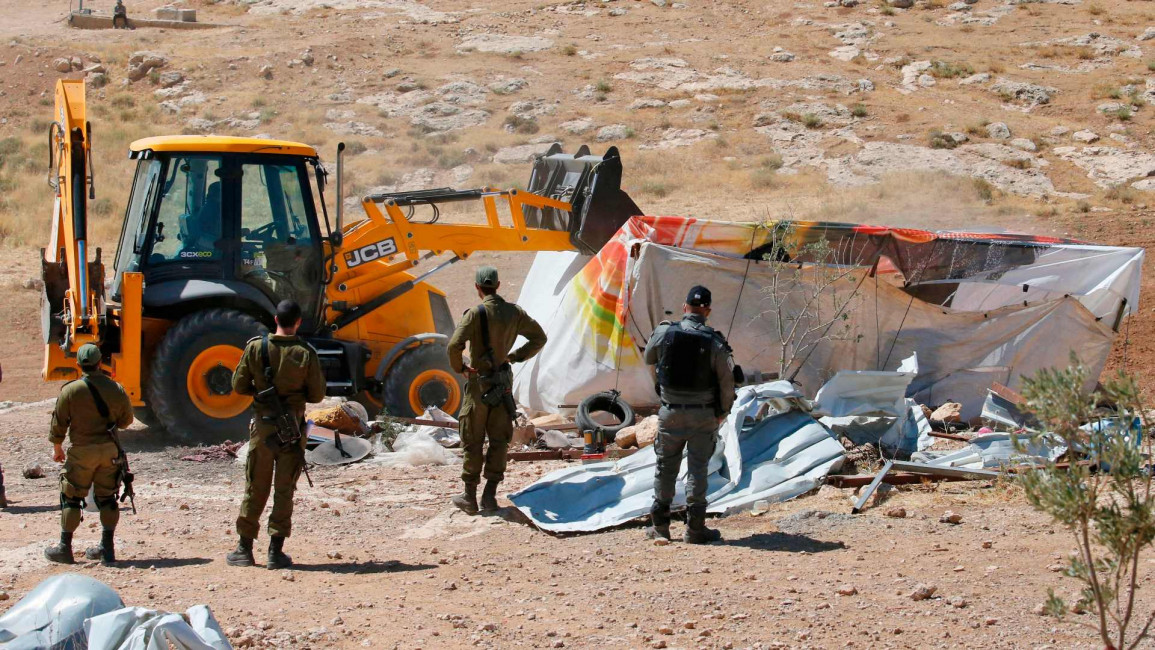Israel refuses to halt planned demolition of Palestinian school
Israel refuses to halt planned demolition of Palestinian school
Israeli authorities plan to demolish a newly built primary school in a remote Palestinian village.
3 min read
Planning permission is nearly impossible to obtain in the West Bank's Area C [Getty]
Children in the West Bank village of Ras Al-Tin face an uncertain future after an Israeli court backed plans to demolish a primary school.
Lawyers had petitioned the decision to demolish the primary school in the West Bank village, calling on Israeli authorities to allow for more time in obtaining building permission to complete the school's construction.
That appeal was rejected by an Israeli court on Wednesday, The New Arab's Arabic-language sister site reported.
Lawyers now plan to petition Israel's Supreme Court but the threat of demolition still looms large as they await a response from the high court.
The Ras Al-Tin primary school was built at the beginning of this academic year. Until then, students used to travel seven kilometres a day to reach the nearest school, located in the Mughayer village.
Its construction was dogged by problems as neighbouring Israeli settlers harassed villagers building the school, with locals prefering to work on the construction at night due to the threat of arrest by soldiers.
Last month, just four days into the school year, Israeli authorities confiscated the tin panels that made up the school's roof, according to Israeli NGO B'tselem.
They also confiscated 30 chairs and 12 classroom tables, forcing students to study on the floor, under the hot sun.
Two similar incidents had occurred in the weeks before, when Israeli authorities confiscated more roof panels and other building materials, chairs, and tables.
The cost of construction
Ras Al-Tin is located in Area C of the West Bank, where Israel retains near complete control including over matters such as planning and construction.
Construction permits are near impossible to obtain for the some 300,000 Palestinians living in Area C, which constitutes around 60 percent of the occupied West Bank and was established during the Oslo Accords.
Buildings without permits are routinely threatened with demolition by the Israeli authorities, which brand such structures illegal.
Between 2010 and 2014, only 1.5 percent of all Palestinian building permit applications across the occupied West Bank were approved by Israel, according to the United Nations.
Lawyers had petitioned the decision to demolish the primary school in the West Bank village, calling on Israeli authorities to allow for more time in obtaining building permission to complete the school's construction.
That appeal was rejected by an Israeli court on Wednesday, The New Arab's Arabic-language sister site reported.
Lawyers now plan to petition Israel's Supreme Court but the threat of demolition still looms large as they await a response from the high court.
The Ras Al-Tin primary school was built at the beginning of this academic year. Until then, students used to travel seven kilometres a day to reach the nearest school, located in the Mughayer village.
Its construction was dogged by problems as neighbouring Israeli settlers harassed villagers building the school, with locals prefering to work on the construction at night due to the threat of arrest by soldiers.
Last month, just four days into the school year, Israeli authorities confiscated the tin panels that made up the school's roof, according to Israeli NGO B'tselem.
They also confiscated 30 chairs and 12 classroom tables, forcing students to study on the floor, under the hot sun.
Two similar incidents had occurred in the weeks before, when Israeli authorities confiscated more roof panels and other building materials, chairs, and tables.
The cost of construction
Ras Al-Tin is located in Area C of the West Bank, where Israel retains near complete control including over matters such as planning and construction.
|
|
Construction permits are near impossible to obtain for the some 300,000 Palestinians living in Area C, which constitutes around 60 percent of the occupied West Bank and was established during the Oslo Accords.
Buildings without permits are routinely threatened with demolition by the Israeli authorities, which brand such structures illegal.
Between 2010 and 2014, only 1.5 percent of all Palestinian building permit applications across the occupied West Bank were approved by Israel, according to the United Nations.
The cost of a permit for a single home is estimated to be in the region of $30,000.
The razing of Palestinian homes has been at a four-year high, between March and August 2020, in spite of coronavirus restrictions and health risks, the UN least month.
"The period from March to August 2020 saw the demolition or confiscation of 389 Palestinian-owned structures in the West Bank, on average, 65 per month, the highest average destruction rate in four years," the UN humanitarian affairs office (UNOCHA) said.
"Sadly, demolitions during the period March-August 2020 left 442 Palestinians homeless, further exposing many to risks associated with the pandemic."
Palestinian citizens of Israel also struggle to acquire planning permission for the construction of homes and other buildings, part of a system that favours Jewish Israelis, Human Rights Watch said earlier this year.
Around 15 to 20 percent of homes in Palestinian-majority towns and villages in Israel are built without permission, according to the Arab Center for Alternative Planning, meaning that as many as 70,000 homes are at risk of demolition.
Follow us on Facebook, Twitter and Instagram to stay connected
Around 15 to 20 percent of homes in Palestinian-majority towns and villages in Israel are built without permission, according to the Arab Center for Alternative Planning, meaning that as many as 70,000 homes are at risk of demolition.
Follow us on Facebook, Twitter and Instagram to stay connected



